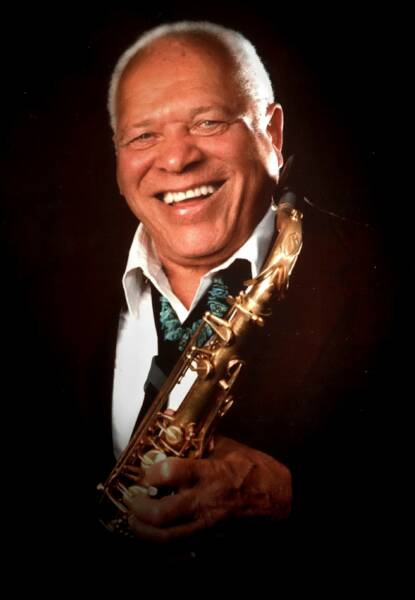Chicago Tribune
May 8, 2008
Franz Jackson 1912 ~ 2008
Legendary Chicago saxophonist Franz Jackson dies at age 95
Worked with such jazz greats as Louis Armstrong and Jelly Roll Morton
By Howard Reich | Tribune critic
May 8, 2008
Few jazz musicians in the 21st Century can claim to have known the two key inventors of the music: trumpeter Louis Armstrong and composer-pianist Jelly Roll Morton.
Franz Jackson, a legendary Chicago saxophonist who performed past his 95th birthday, worked with Armstrong, socialized with Morton and collaborated with Count Basie, Cab Calloway, Ella Fitzgerald, Fletcher Henderson and other swing-era icons.
As a virtuoso saxophonist, brilliant clarinetist and evocative vocalist, Mr. Jackson was a mainstay in Chicago jazz clubs and concert halls dating back to the Roaring '20s (except for a period in the late 1930s and '40s, when he lived in New York and Sweden).
Mr. Jackson, 95, died of natural causes early Tuesday, May 6, in Riveridge Manor, a nursing home in Niles, Mich., said his daughter, Michelle Jewell. He had suffered a hip fracture in April, she said.
Though listeners marveled at Mr. Jackson's ability to play so well for so long—he performed for more than two hours straight at a 95th birthday celebration last November—it was the particular nature of his sound that always commanded attention.
"When I think of Franz, I just think of a big, powerful saxophone," said Eric Schneider, a Chicago tenor player who frequently performed with Mr. Jackson.
"He reminded me of Coleman Hawkins," added Schneider, referring to a seminal tenor saxophonist of a more romantic era. "But he had his own thing too."
Indeed, if Mr. Jackson embraced the larger-than-life sound that was the hallmark of swing giants Hawkins and Ben Webster, he also incorporated elements of the more ethereal sounding tenorist Lester Young.
At the core of Mr. Jackson's music, though, was a deep well of soulful expression, conveyed in poetically stated melodies and touched-by-the-blues phrasings.
"He was the real thing—the authenticity of his playing" distinguished him, said Art Hoyle, a noted Chicago trumpeter who often partnered with Mr. Jackson. "He was virtually there when the music was in its infancy. When you talked to him, you were talking to history."
Mr. Jackson was born Nov. 1, 1912, in Rock Island, Ill., and came to Chicago with his mother when he was 13. He quickly began teaching himself to play reed instruments and at 16 was working with a pioneer of boogie-woogie piano, Albert Ammons. By the early 1930s, Mr. Jackson was playing for bandleader-composer Henderson—widely considered the architect of big-band swing—and learning to write scores from him.
"That was a great time to be with Fletcher, too, because he was doing a lot of [arranging] work for Benny Goodman's band at the time," Mr. Jackson said in a 1992 Tribune interview. "Basically, he was taking his great old charts and rewriting them for the Goodman band."
Mr. Jackson's education continued apace, for by performing with Armstrong, trumpeter Roy Eldridge and other innovators based in Chicago, Mr. Jackson absorbed the language of early jazz as it was being created and refined.
He moved to New York with his first wife, Maxine Johnson, in the late 1930s, but he found the jazz scene there cliquish. Even so, in Manhattan he befriended the virtually out-of-work Morton, in the waning days of the great composer's life.
By 1950, Mr. Jackson returned to Chicago, leading his Original Jass All-Stars for years at the Red Arrow club in Stickney. Although many musicians of his vintage rejected the bebop innovations that supplanted swing, Mr. Jackson absorbed them into his own, remarkably malleable work.
"A lot of guys didn't like it when bebop came along, but I liked it fine," Mr. Jackson said in the Tribune interview. "I could understand it because I knew the bebop guys like Dizzy [Gillespie] before they became famous; I played with them."
Even into his 90s, Mr. Jackson remained a strikingly charismatic figure, singing vintage tunes such as "St. James Infirmary" and "Limehouse Blues" with a vocal grit and a declamatory style rarely encountered anymore. In a marathon concert with the Chicago Jazz Ensemble three years ago in Chicago, he held his own against tenor monsters such as Johnny Griffin, Von Freeman and Ira Sullivan.
"He did exactly what he loved his entire life, he made a living at it, he raised his family on it," said his daughter. "If I have one regret, it's that he's not more widely known," she said, though Mr. Jackson's recordings—on labels such as Delmark and his own Pinnacle Recordings—are available on his Web site: franzjackson.com.
"But he was the heart of jazz."
On May 15, Mr. Jackson—who lived in Chicago and Dowagiac, Mich.—will posthumously receive the 2008 Theodore Thomas History Maker Award for Distinction in the Performing Arts from the Chicago History Museum.
In addition to his daughter, Mr. Jackson is survived by a son, Robert; five grandchildren; and a step-grandchild.
A memorial service will be held from 1 to 3 p.m. May 24 in the Apostolic Lighthouse Church in Dowagiac, Mich.
hreich@tribune.com
